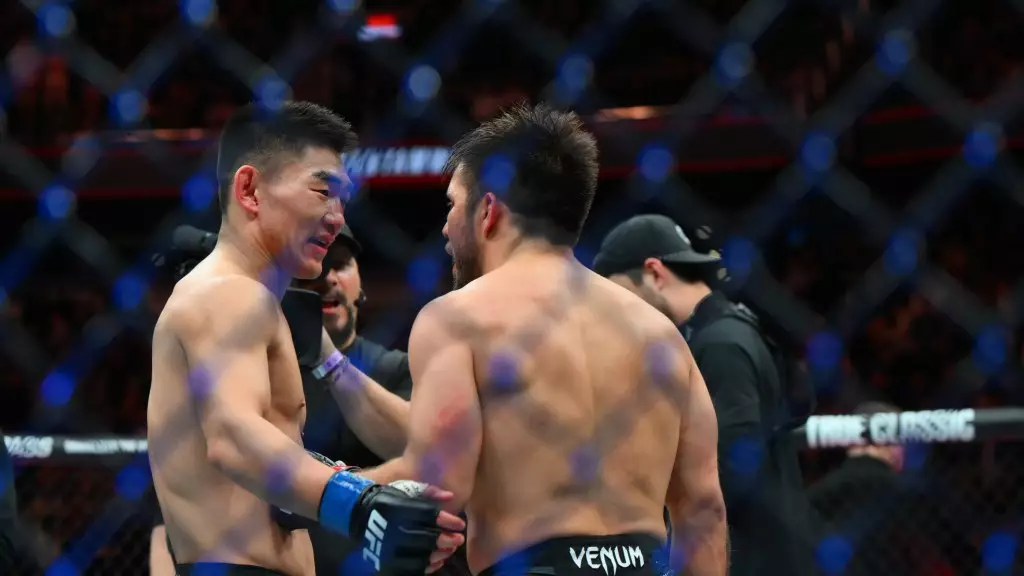Henry Cejudo, a former two-division UFC champion, finds himself in the rare position of having lost three consecutive fights, a string that puts significant pressure on his career. His latest defeat came against Song Yadong at UFC Fight Night 252, a bout that ended in a technical decision after an inadvertent eye poke rendered Cejudo unable to continue effectively due to impaired vision. Cejudo’s insistence that he did not lose the fight raises questions about the integrity of the match and offers a window into the psychology of a fighter grappling with the realities of defeat.
Cejudo’s public reaction to the fight and the subsequent decision underscores his refusal to accept the outcome as final. His social media posts convey an urgent desire for a rematch, reflecting not only his disappointment but also the competitive spirit that has defined much of his career. He claims that both he and Yadong hold a mutual agreement that the fight should be revisited, though UFC President Dana White’s dismissal of the rematch points to the complexities of matchmaking in a sport where public outcry and fighter narratives often intersect.
The eye poke incident occurred in the third round and has led to debates over its impact on the fight’s outcome. Cejudo maintains that the eye poke significantly hampered his performance, leading him to argue that he was competing under unfair circumstances when the fight concluded. Conversely, Yadong came out swinging as soon as the action resumed, indicating a strategic advantage that, depending on one’s interpretation, might supersede the incident.
While Cejudo’s insistence on the rematch stems from perceived injustice, it raises ethical considerations about how much weight should be placed on such incidents. Fighters train extensively to prepare for bouts, and unexpected occurrences like eye pokes are risks built into the sport. In sports psychology, accepting defeat can often spur development, whereas lingering on the idea of an unjust loss may hinder a fighter’s progress.
Cejudo’s professional arc in mixed martial arts (MMA) has undergone significant shifts since he unexpectedly retired in 2020. His premature exit followed a triumphant title defense and left fans wondering about his legacy. After a three-year hiatus, his return attempts to reclaim the bantamweight championship have been notably lackluster, characterized by losses that could influence a fighter’s mental fortitude. The psychological burden of a losing streak could weigh heavily on any athlete, particularly one with Cejudo’s accolades.
The case of Cejudo serves as a reminder that fighting can be as much about mental resilience as physical prowess. Having once held the bantamweight and flyweight titles, he is now confronted with questions about his ability to adapt post-retirement. As fighters readjust to the rigors of the Octagon, understanding the mental aspect becomes crucial. Cejudo’s hardships may push him to rethink his long-term strategy in the sport, focusing more on the mindset required to overcome not just opponents but also personal psychological barriers.
UFC’s matchmaking decisions can significantly shape the landscape of the division, and Cejudo’s situation raises pertinent questions about managing fighter narratives amidst the rigid structures of professional competition. The issue isn’t just about one fighter’s desire for a rematch; it also reflects the broader competitive environment within the UFC, where many fighters are clamoring for title shots and rematches. Song Yadong’s victory further complicates this narrative, as he reinvigorates interest within the bantamweight division after his own losses.
Tension mounts within divisions when fighters feel their narratives are overlooked, especially when they believe they have legitimate claims to rematches. As Cejudo continues to advocate for an opportunity to rectify what he considers an unjust defeat, UFC executives face the challenge of balancing competitive integrity with business considerations—questions of entertainment value versus the merit-based ranking system that governs title shots.
Henry Cejudo’s three-fight losing streak places him in an uncomfortable position, further compounded by his call for a rematch against Song Yadong. As this narrative unfolds, it becomes vital to analyze the implications of such situations in professional MMA. Understanding the interplay of sport, psychology, and promotional decisions will shape not only Cejudo’s future but also that of the bantamweight division as a whole. Fans and executives alike continue to grapple with the question—when is it appropriate to grant a rematch? In the world of UFC, where prestige and victory dictate fame, Cejudo’s claim serves as a poignant reminder of the ongoing struggles athletes face in navigating their careers amid unforeseen challenges.

